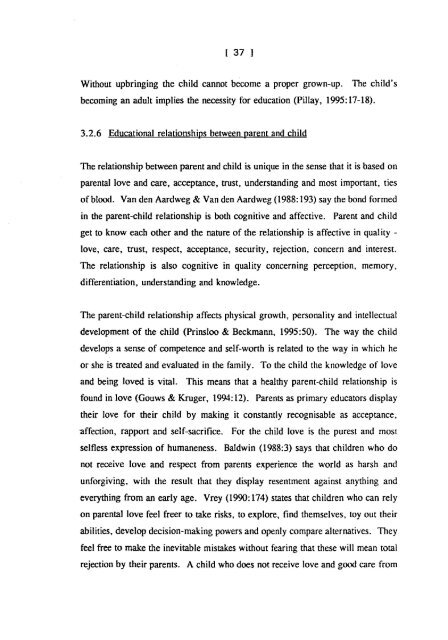parents and principals as partners in creating a culture of learning
parents and principals as partners in creating a culture of learning
parents and principals as partners in creating a culture of learning
You also want an ePaper? Increase the reach of your titles
YUMPU automatically turns print PDFs into web optimized ePapers that Google loves.
[ 37 1<br />
Without upbr<strong>in</strong>g<strong>in</strong>g the child cannot become a proper grown-up. The child's<br />
becom<strong>in</strong>g an adult implies the necessity for education (PiIlay, 1995: 17-18).<br />
3.2.6 Educational relationships between parent <strong>and</strong> child<br />
The relationship between parent <strong>and</strong> child is unique <strong>in</strong> the sense that it is b<strong>as</strong>ed on<br />
parental love <strong>and</strong> care, acceptance, trust, underst<strong>and</strong><strong>in</strong>g <strong>and</strong> most important, ties<br />
<strong>of</strong>blood. Van den Aardweg & Van den Aardweg (1988: 193) say the bond formed<br />
<strong>in</strong> the parent-child relationship is both cognitive <strong>and</strong> affective. Parent <strong>and</strong> child<br />
get to know each other <strong>and</strong> the nature <strong>of</strong> the relationship is affective <strong>in</strong> quality <br />
love, care, trust, respect, acceptance, security, rejection, concern <strong>and</strong> <strong>in</strong>terest.<br />
The relationship is also cognitive <strong>in</strong> quality concern<strong>in</strong>g perception, memory,<br />
differentiation, underst<strong>and</strong><strong>in</strong>g <strong>and</strong> knowledge.<br />
The parent-child relationship affects physical growth, personality <strong>and</strong> <strong>in</strong>tellectual<br />
development <strong>of</strong> the child (Pr<strong>in</strong>sloo & Beckmann, 1995:50). The way the child<br />
develops a sense <strong>of</strong> competence <strong>and</strong> self-worth is related to the way <strong>in</strong> which he<br />
or she is treated <strong>and</strong> evaluated <strong>in</strong> the family. To the child the knowledge <strong>of</strong> love<br />
<strong>and</strong> be<strong>in</strong>g loved is vital. This means that a healthy parent-child relationship is<br />
found <strong>in</strong> love (Gouws & Kruger, 1994: 12). Parents <strong>as</strong> primary educators display<br />
their love for their child by mak<strong>in</strong>g it constantly recognisable <strong>as</strong> acceptance,<br />
affection, rapport <strong>and</strong> self-sacrifice. For the child love is the purest <strong>and</strong> most<br />
selfless expression <strong>of</strong> humaneness. Baldw<strong>in</strong> (1988:3) says that children who do<br />
not receive love <strong>and</strong> respect from <strong>parents</strong> experience the world <strong>as</strong> harsh <strong>and</strong><br />
unforgiv<strong>in</strong>g, with the result that they display resentment aga<strong>in</strong>st anyth<strong>in</strong>g <strong>and</strong><br />
everyth<strong>in</strong>g from an early age. Vrey (1990: 174) states that children who can rely<br />
on parental love feel freer to take risks, to explore, f<strong>in</strong>d themselves, toy out their<br />
abilities, develop decision-mak<strong>in</strong>g powers <strong>and</strong> openly compare alternatives. They<br />
feel free to make the <strong>in</strong>evitable mistakes without fear<strong>in</strong>g that these will mean total<br />
rejection by their <strong>parents</strong>. A child who does not receive love <strong>and</strong> good care from

















